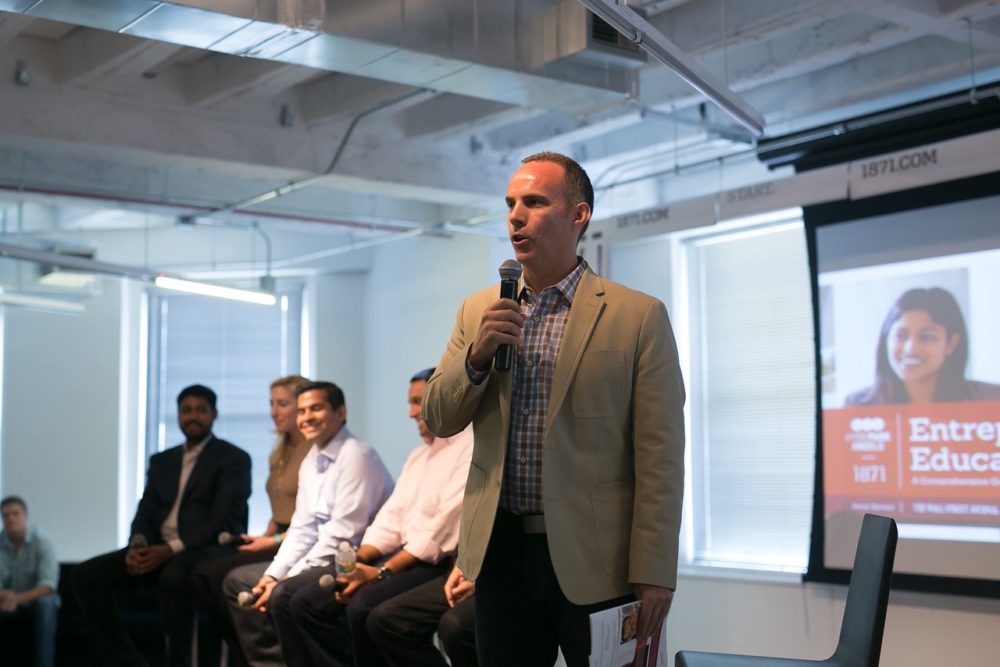Early-Stage Investment 101

We launched “Early-Stage Investment 101,” the second program of our four-part early-stage investment education series for entrepreneurs in collaboration with partner 1871 and series sponsor The Wall Street Journallast week.
The event brought together powerhouse entrepreneurs and investors Sach Chitnis (Jump Capital), Aashish Dalal (ParkWhiz), Rishi Shah (ContextMedia), Ira Weiss (Hyde Park Venture Partners, Chicago Booth), and Desiree Vargas Wrigely (GiveForward) to share their experiences and give invaluable advice on raising capital.
If you missed the event or just want more, read on for highlights from the discussion.
Key Takeaways
While the panel focused on a wide variety of technical topics, including convertible debt versus equity, which terms to negotiate, and alternate funding sources to institutional capital, the conversation centered on investor-entrepreneur relationships.
As Rishi Shah, Founder and CEO of ContextMedia and Managing Partner at JumpStart Ventures aptly pointed out, “When you take on institutional capital, it really is a marriage. And it’s really best to being those relationships months early.” Namely, as entrepreneurs, you shouldn’t wait until you’re raising money before reaching out to investors and building relationships with them. Ultimately, finding a good match — investors who support your vision and can work with you productively to grow your businesses — is critical to your success. Before entering such an important commitment, you should know your partners as well as possible.
Building these relationships early by reaching out to investors for informational meetings and consulting them as advisors or experts also helps with one major element of the funding process: finding a deal lead. Ira Weiss, General Partner at Hyde Park Venture Partners and Professor of Accounting and Entrepreneurship at the University of Chicago Booth School of Business, pointed out “for these really early rounds, if you can’t find a lead investor, you as an entrepreneur have to go and convince people [which takes time].” If you already have investors lined up from preexisting relationships, you can spend more time with your business and less time fighting to get funded.
But as Desiree Vargas-Wrigely, Founder and Chief Strategy Office of GiveForward stressed, just because investors don’t fund you, doesn’t mean they don’t add value or the time you spent with them wasn’t worthwhile. In fact, they can be extremely helpful when you make decisions about your raise, such as setting your valuation. She advised, “Ask investors that aren’t investing in you what you’re worth.” This strategy will allow you to get objective feedback as well as an understanding of how investors who aren’t “too close” to you view the market.
When you do get to the term sheet, Aashish Dalal, CEO and Founder of ParkWhiz, recommended not getting too caught up in just one term, like valuation. Instead, he said, “What I value most is valuation, liquidation preference, and board structure. It’s like a three-legged stool, take one out, and the whole thing falls.” Ultimately, he cautioned entrepreneurs against losing sight of the two crucial aspects of a term sheet: stake and control. Both are critical because they play into one another.
While you should care about these terms, once you finalize the term sheet, you should trust your new partners. “The term sheet is the pre-nup. You should never, ever look at the document ever again if you have a good relationship,” Sach Chitnis, General Partner at Jump Capital emphasized. The goal is to get your business to grow and evolve over time; obsessing over your contract won’t help with that.
Get the Tools You Need to Follow Their Advice
Now you know what the panelists think and recommend, where do you go from here? How do you execute on their advice?
· Watch the full event
· Understand the early investment stages
· Find the right investors
· Get funded more simply and seamlessly
· Negotiate your terms
· Download our full program